Congratulations to our six new J.A. DeSève Student Success Scholarship winners, each receiving $5,000 to recognize their perseverance and determination, and support them in completing their master's or doctoral program.
Discover the six students receiving this scholarship:
Yassine Abdelmalki, doctoral student in biology, under the supervision of Professor Marie-Claude Sincennes
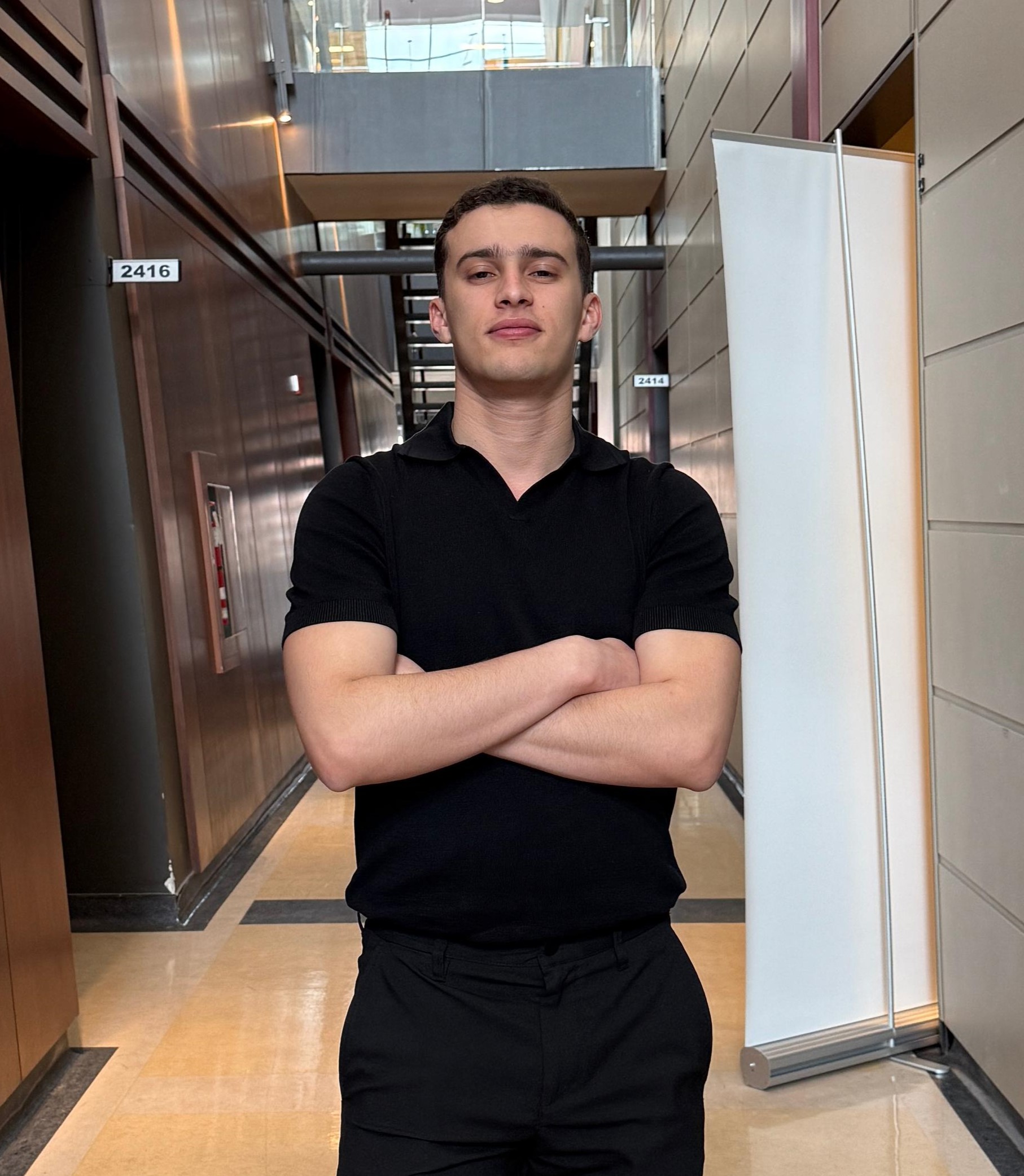
"Receiving the J.A. DeSève Scholarship is a tremendous honour and a valuable recognition of my commitment to scientific research. This distinction testifies to the confidence placed in the relevance of my work and the rigour of my academic path."
- What brought you to INRS? What do you remember about your experience?
Driven by a quest for excellence in every facet of my career, it seemed natural to choose the Institut national de la recherche scientifique (INRS) to undertake my doctoral studies in biology. For me, INRS embodies the rare combination of rigorous teaching, cutting-edge research and a highly collaborative environment. My experience there has been profoundly influential: beyond the first-rate scientific infrastructure, it's the spirit of innovation, personalized support and interdisciplinary openness that have shaped my development, both intellectually and professionally. Being part of this community of committed researchers has been a privilege and a daily driving force towards excellence. - Can you describe the challenge and impact of your research project?
At the heart of my research project is the study of fusion-positive rhabdomyosarcoma, a rare and aggressive pediatric tumor for which therapeutic options remain limited. My work aims to understand the central role of the PAX7-FOXO1 fusion protein in the deregulation of gene expression and the tumor process. By identifying the critical target genes of this protein and exploring new therapeutic avenues, my project aims to make significant advances. Ultimately, it aims to foster the emergence of more specific, more effective and better tolerated treatments, for the benefit of young patients for whom the medical needs remain crying. - What does winning this scholarship mean to you?
Receiving the J.A. DeSève Scholarship is an immense honour and a precious recognition of my commitment to scientific research. This distinction testifies to the confidence placed in the relevance of my work and the rigor of my academic path. It also represents a powerful incentive to pursue with passion and determination the quest for innovative solutions to the challenges posed by pediatric cancers. Through this scholarship, I am fully aware of the importance of institutional support in the development of up-and-coming scientists. - How do you see the future?
Faithful to the dynamic of excellence that has guided my career, I intend to pursue my research with the same high standards and ambition. In the medium term, I hope to deepen my expertise, multiply my collaborations, and contribute to the advancement of knowledge in cancer biology through large-scale research projects. In the longer term, I aspire to develop a career as an independent researcher, guided by the desire to make science shine in the service of public health, and to inspire a new generation of scientists to constantly push back the frontiers of knowledge.
Hermine Counil, doctoral student in biology, under the supervision of Professor Charles Ramassamy

"Obtaining this scholarship has enabled me to complete my work in the laboratory and defend my thesis in a more serene manner. The moral and financial support of INRS has made a big difference to the success of my studies."
- What brought you to INRS? What do you remember about your experience?
I discovered INRS in 2019 during my Master's studies through a collaboration between research teams in France and Quebec. During this internship, I had the opportunity to exchange with Professor Ramassamy and thus discovered the world of extracellular vesicles. Our exchanges led to the creation of a project on the involvement of these vesicles in the pathogenesis of Alzheimer's disease, and my move to Canada to complete my doctorate at INRS. My experience was very rich, both from a scientific and professional point of view, and from a human one. I've grown a lot and made some wonderful encounters in the student and faculty community. I'm sure some of these relationships will last a long time. - Can you describe the challenge and impact of your research project?
My PhD project demonstrated that extracellular vesicles released by all organs and circulating in the blood cross the blood-brain barrier and reach the brain. This work is of major importance, as it demonstrates for the first time that peripheral vesicles can modify the activity of immune and neuronal cells in the brain, creating a pro-inflammatory environment associated with Alzheimer's disease. As such, peripheral vesicles could mediate the relationship between inflammatory pathologies affecting peripheral organs and the development of brain diseases such as Alzheimer's. Further studies are needed to confirm these findings in humans, but our data represent an important breakthrough for a better understanding of Alzheimer's disease and brain function. - What does winning this scholarship mean to you?
Winning this scholarship has enabled me to complete my work in the laboratory and defend my thesis more serenely. The moral and financial support of INRS has made a big difference to the success of my studies. What's more, this bursary is a fine recognition of my resilience and passion for research, despite the difficulties that can be encountered. - How do you see the future?
Extremely passionate about research, I would like to do a post-doctorate in neuroscience and possibly pursue an academic career. However, I'm always open to new opportunities. I can't wait to find out what the future holds for me!
Ramin Farhadiani, PhD student in water sciences, under the supervision of Professor Saeid Homayouni
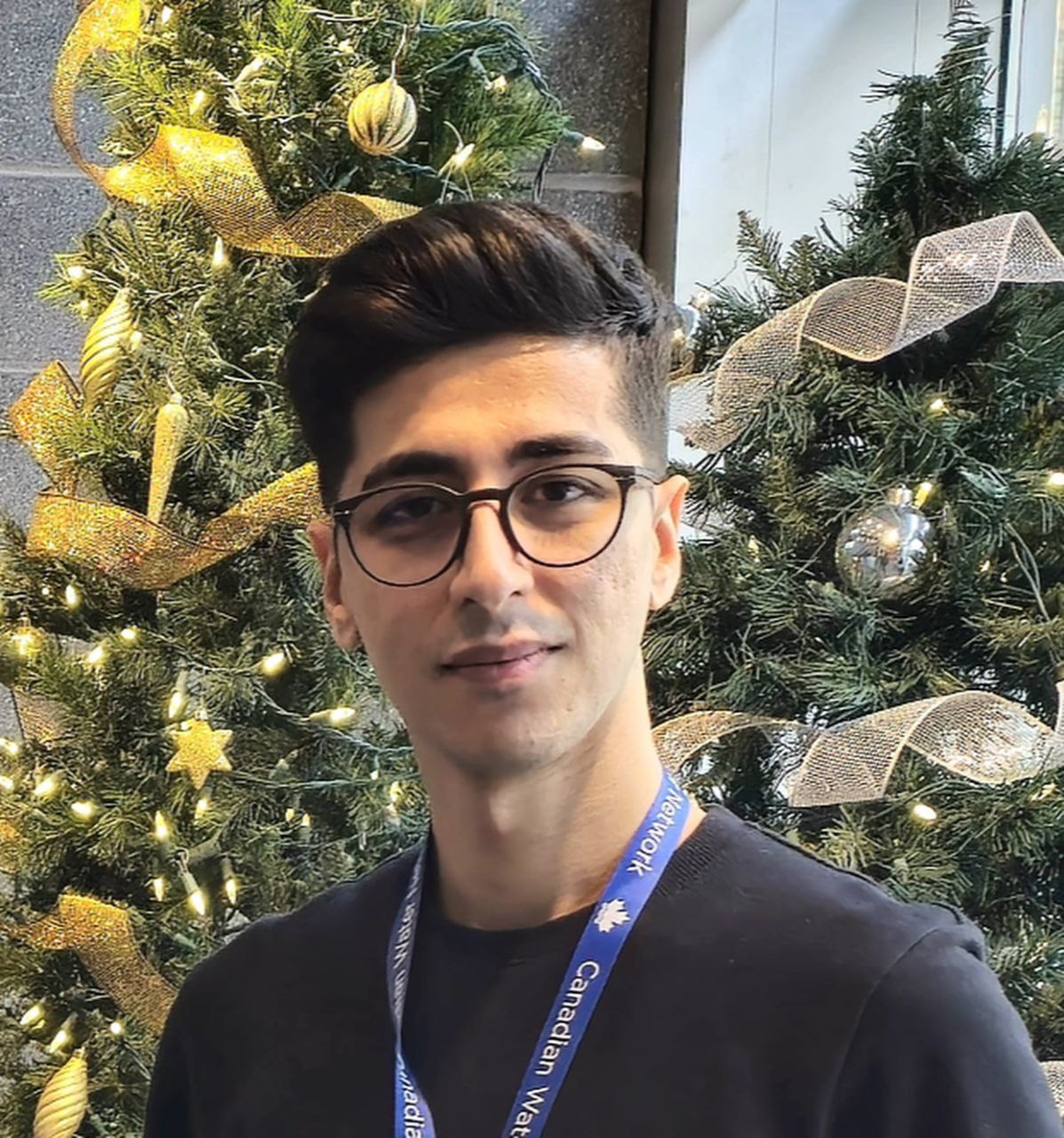
“Receiving the J.A. DeSève Foundation scholarship is a great honor that motivates me to continue my research and allows me to devote myself fully to my work.”
- What brought you to INRS? What do you remember about your experience?
I was attracted to INRS for its cutting-edge research environment and the opportunity to work under the direction of Professor Saeid Homayouni, whose expertise in remote sensing inspired me. I acquired advanced technical skills and a collaborative spirit that will shape my career. - Can you describe the challenge and impact of your research project?
My research focuses on the use of satellite-based interferometric synthetic aperture radar (InSAR) for dam monitoring. I am designing an advanced deep learning model to predict future dam deformations, enabling an early warning system to be set up to improve safety and prevent failures. - What does winning this scholarship mean to you?
Receiving the J.A. DeSève Foundation bursary is a great honour, motivating me to continue my research and enabling me to devote myself fully to my work. - How do you see the future?
I plan to refine my prediction model through deep learning, validate it with real data and collaborate with industry partners to implement an early warning system, contributing to safer dam management practices in Canada and around the world.
Antoine Gillet, doctoral student in biology, under the supervision of Professor Géraldine Delbès
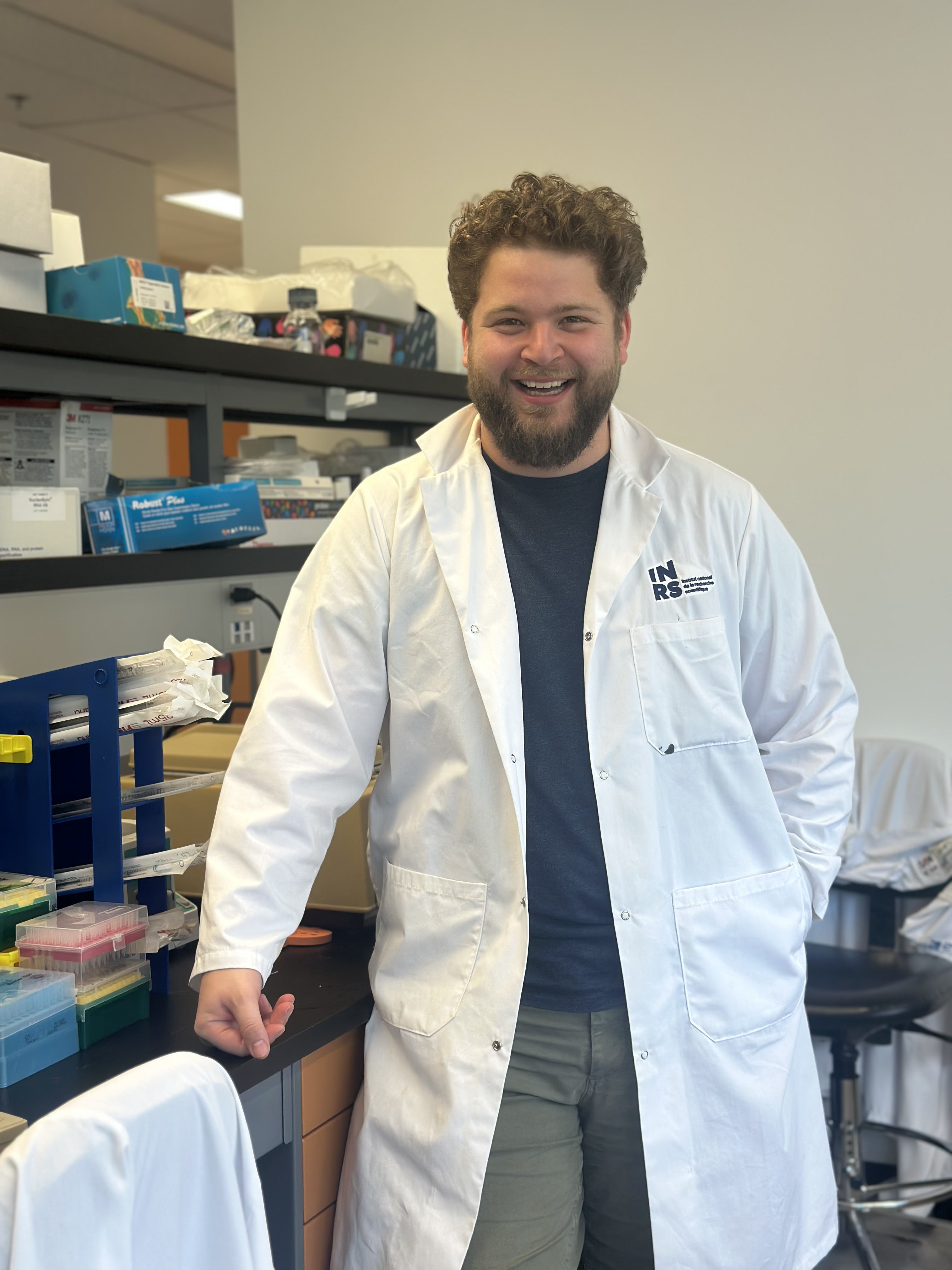
“This grant recognizes my perseverance in my research and in a way acknowledges the quality of my work in the laboratory.”
- What brought you to INRS? What do you remember about your experience?
My choice to come to INRS was motivated by the choice of my research director. I learned of Géraldine Delbès' research themes at the end of 2019 and immediately saw that they were in line with the questions I was asking myself at the time and my areas of interest, namely environmental toxicology and reproductive physiology. I then applied for an internship in his laboratory in 2020, which had to be cancelled due to the pandemic. We kept in touch and kept in touch, then in 2021, she had a new project opening in her lab, she presented it to me and I was immediately motivated, so I applied for a PhD on this project. - Can you describe the challenge and impact of your research project?
My research project aims to characterize the airborne exposome in the urban environment and identify the presence of endocrine disruptors (EDs) in this matrix. Today, despite numerous studies on endocrine disruptors, the airborne exposome, particularly in urban environments, is the least well characterized. The main aim of my project is therefore to fill this gap and improve knowledge on this subject. The main impact of my project is a better characterization of the human PE exposome. It will also show that outdoor air can be a source of exposure and should not be neglected. It will position Montreal as a pioneer in the monitoring of endocrine disruptors in outdoor air and, why not, motivate such monitoring in other cities. In the long term, it could also motivate public decision-makers to introduce better regulations. - What does winning this scholarship mean to you?
This award recognizes my perseverance in my research and, in a way, the quality of my work in the laboratory. Even if this grant is offered to me in recognition of my achievements, my project is that of a large team where everyone works hard, so it also indirectly recognizes everyone's work. Finally, it also recognizes the involvement of my research director, who has always enabled me to develop in a stimulating environment and under appropriate conditions. - How do you see the future?
I'm currently in the final year of my PhD and aim to defend it in spring 2026. In the short term, I want to continue to invest myself fully in my project, write my thesis and defend my doctorate. All this will recognize several years of research on a truly fascinating subject and the involvement of a great team. In the medium term, I'd like to take some time for myself, travel and think about my future, as I'm not yet sure of my long-term life choices. I'm still hesitating between a post-doctorate, going to work in industry or in regulatory bodies (Health Canada, OECD...). But one thing I'm sure of is that I want to continue working in research, and more specifically in environmental toxicology. One of the things I really loved about my PhD project was the fieldwork part, and I'd like to continue that. I'd say that today my heart is set on a post-doctorate in environmental toxicology, with a particular attraction for exposures in Canada's Far North and First Nations.
Andrés Felipe Gonzalez Mora, doctoral student in water sciences, under the supervision of Professor Alain Rousseau
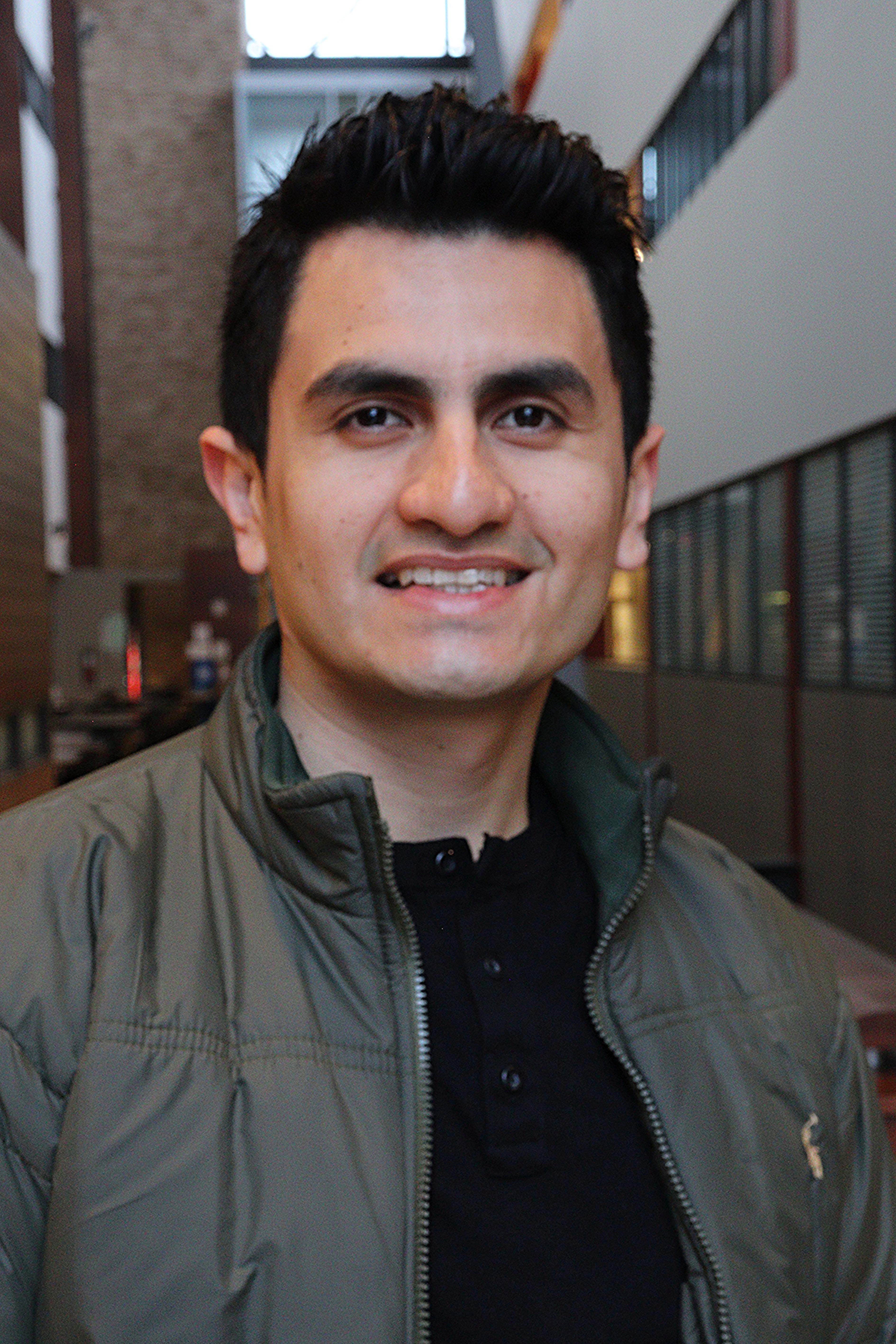
"Winning the J. A. DeSève scholarship from the INRS Foundation gives me a great sense of joy and pride. It represents the perseverance and dedication in my academic activities during these years at INRS."
- What brought you to INRS? What do you remember about your experience?
After finishing my bachelor's degree in Agricultural Engineering in Colombia, I wanted to continue my training as a young researcher and contribute to answering questions about the environment and water resources in a changing climate. So I chose to become a student at INRS. For me, the Centre Eau Terre Environnement was, and still is, an ideal place for academic and professional training for those who are curious about life. My experience at INRS was filled with learning, curiosity, personal growth and friendships. - Can you describe the challenge and impact of your research project?
We often hear about the consequences of global warming on watercourses. More often than not, we can feel these impacts with more floods, particularly in Quebec, in the form of earlier spring floods and stronger summer floods, representing a major issue for the region's populations and economy. Hence the importance of studying the climate-flow relationship and the particular interest in hydroclimatic modelling to improve our understanding of these extreme events in the context of climate change.
Despite the interest, the approach remains complex to implement and its results need to be interpreted with care. Hydroclimatic modeling also faces uncertainties associated with the very design of the modeling chain combining hydrological models and future scenarios.
As part of my doctoral project, I am interested in studying the evolution of floods in rivers in southern Quebec, based on the application of new simplified and robust approaches. These new approaches, involving the use of machine learning algorithms and the application of Bayesian inference, will enable us to estimate the trend and characterize the uncertainty of these events between now and the end of the century. - What does winning this scholarship mean to you?
Winning the J. A. DeSève scholarship from the INRS Foundation gives me a great sense of joy and pride. It represents perseverance and dedication in my academic activities during these years at INRS. I am grateful to the Fondation J. A. DeSève and the INRS Foundation for their interest in the student community to improve our financial conditions and enable us to contribute to our fields of research. - How do you see the future?
Winning this grant will enable me to complete my thesis research at INRS, and encourages me to continue my work and training as a young researcher, while maintaining the curiosity and scientific rigor acquired during my time at INRS.
Chandra Li Hernandez Joa, Master's student in Urban Studies, under the supervision of Professor Stéphane Guimont-Marceau
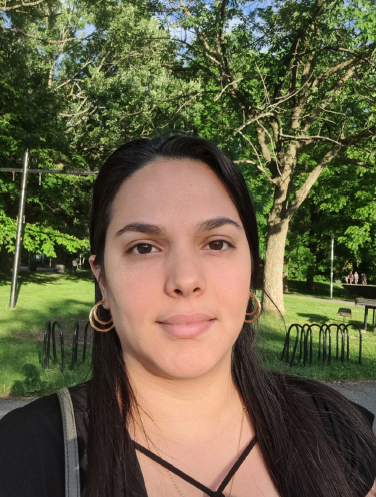
“Winning the J.A. DeSève Scholarship represents for me an important recognition of the work I have accomplished, as well as an encouragement to continue my efforts in committed, rigorous and socially relevant research.”
- What brought you to INRS? What do you remember about your experience?
Before starting my studies at INRS, I worked for four years in the tourism sector in Cuba. This experience inspired me to explore a related but different field: urban studies. I wanted to better understand the social, spatial and migratory dynamics that shape our societies, beyond the tourism perspective alone.
I was attracted to INRS by its critical approach, its interdisciplinary openness and the opportunity to conduct research rooted in social reality. My time here has been deeply formative, both intellectually and personally. I've had the chance to work in the field, in direct contact with migrants, which has enabled me to approach research not just as an academic exercise, but also as a human and social commitment. - Can you describe the challenge and impact of your research project?
My project is entitled “Cultivating dreams, overcoming challenges: an exploration of the well-being experiences of temporary agricultural workers in Montérégie, Quebec”. It aims to understand how these workers live their daily lives under the Temporary Foreign Worker Program and the Seasonal Agricultural Worker Program, focusing on the forms of well-being they manage to build despite the often precarious conditions associated with their migratory status, their social isolation and their dependency on their employer.
The main challenge is to highlight not only the structural challenges they face, but also their capacity to act and the strategies they develop to preserve their dignity and well-being. The impact of this research is as much scientific, by enriching knowledge on labor migration, as it is social, by giving a voice to an often-invisible population and contributing to critical reflection on migration policies. - What does winning this scholarship mean to you?
For me, winning the J.A. DeSève grant is a major recognition of the work I've accomplished, as well as an encouragement to pursue my efforts in committed, rigorous and socially relevant research. It's also a great way of promoting qualitative research that's sensitive to realities in the field, and I'm very grateful to the Foundation for enabling me to complete my dissertation in the best possible conditions. - How do you see the future?
I'm currently writing my dissertation, which I plan to submit in the summer of 2025. After that, I'd like to continue working on migration issues, whether in academia or in the community.
We would like to thank our donor for its continued support. By contributing to student success, the Fondation J.A. DeSève demonstrates its confidence in the next generation of scientists and its commitment to the development of society through research. Its generosity enables us to recognize the hard work, perseverance and resilience of up-and-coming young researchers, the next generation of scientists in Quebec and beyond.
Congratulations to all our recipients!
The scholarship competition opened in October January and closed on December 9. It was managed by the Service des études supérieures et de la réussite étudiante (SESRE) and attracted a great deal of interest from our student community.
The INRS Foundation extends its warmest thanks to the SESRE team for its invaluable support, as well as to the members of the selection committee and all those who submitted their entries, helped disseminate the information and ensured the smooth running of the competition.
ABOUT THE J.A. DESÈVE FOUNDATION SCHOLARSHIPS

.png)